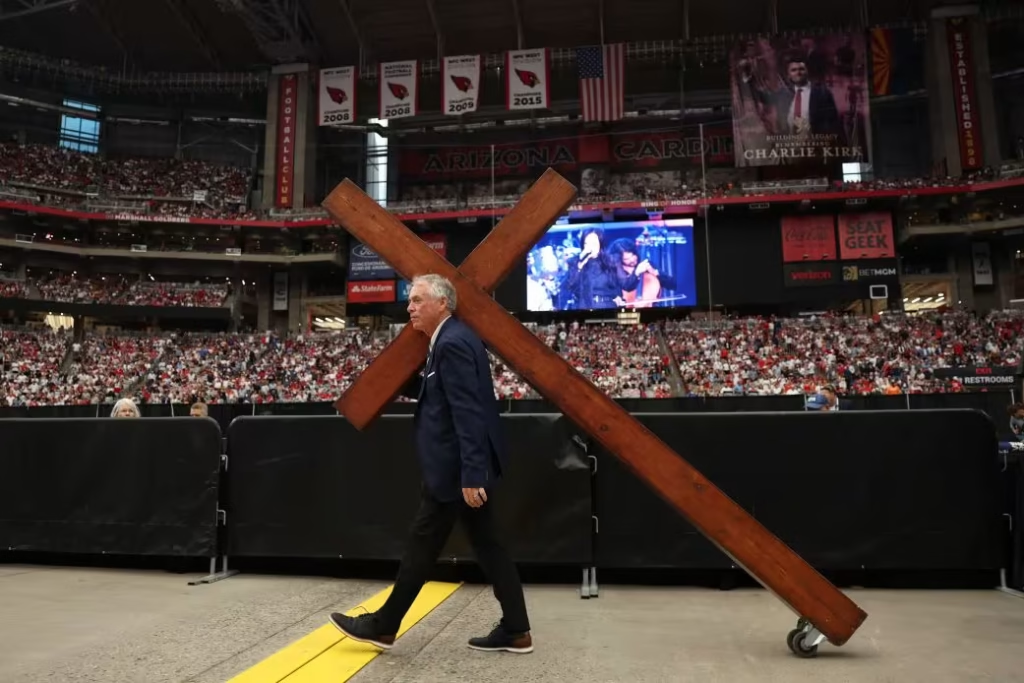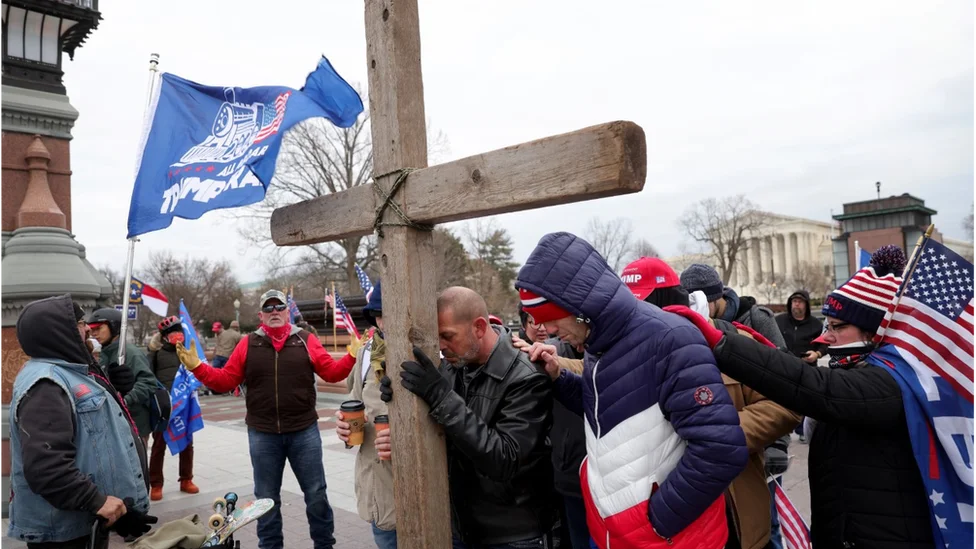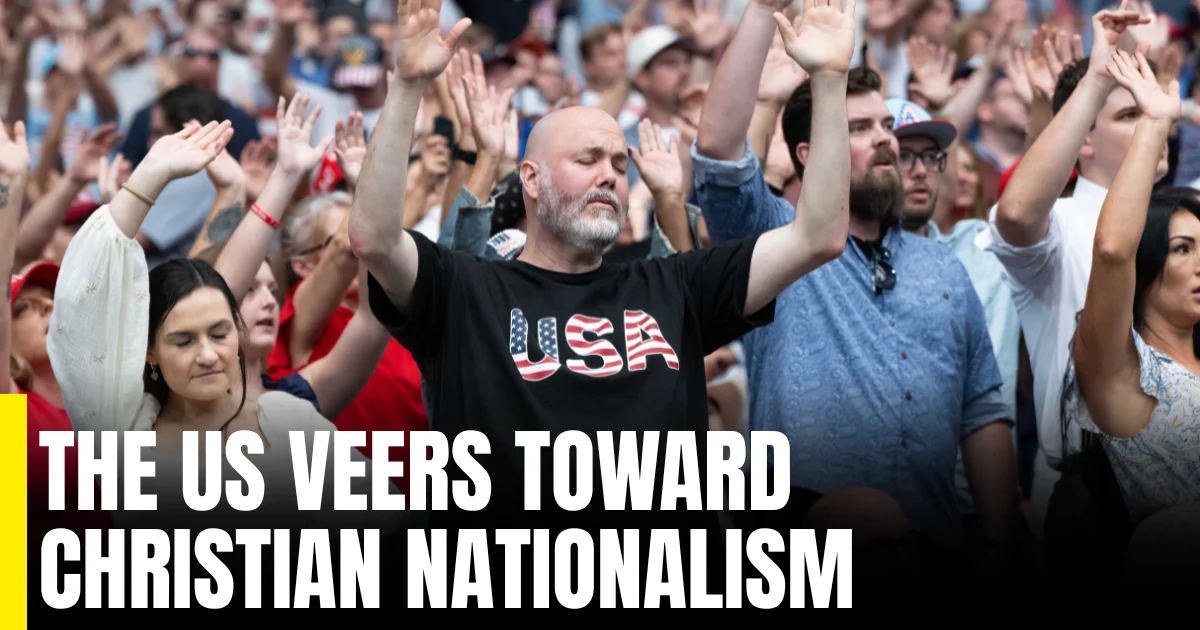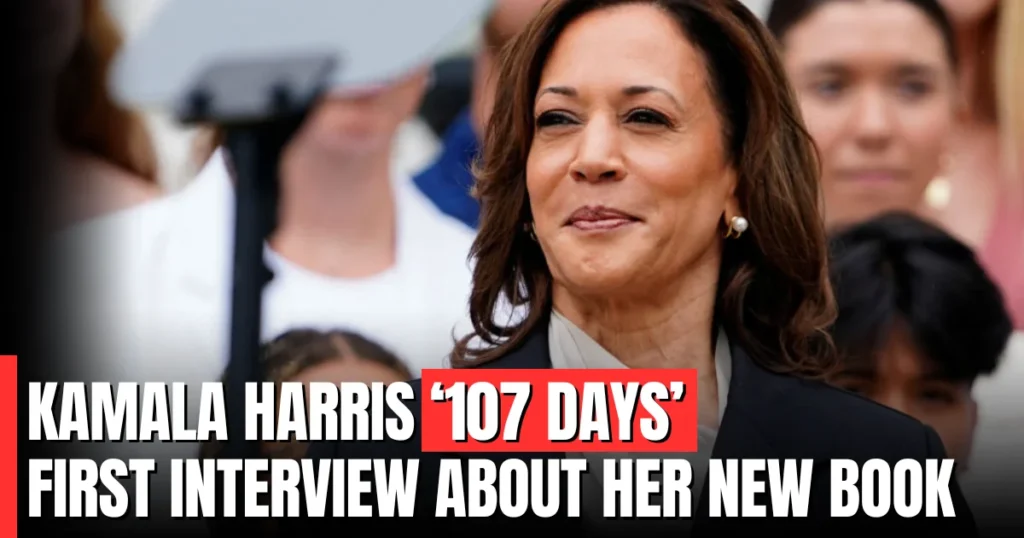The US faces rising Christian nationalism as Trump officials fuse religion with governance. What it means for democracy, law, and society. Read more.
Table of Contents
The US Veers Toward Christian Nationalism
Introduction
For generations, Americans have been taught that the separation of church and state is a cornerstone of democracy. The First Amendment ensures both freedom of religion and protection from government-imposed faith. Yet under President Donald Trump, political actions and rhetoric are increasingly blurring those boundaries. Recent events — from top officials invoking Jesus at memorial services to policy shifts promoting religion in public institutions — point to a broader trend: the United States moving closer to Christian nationalism.

Leaders Merge Faith With Governance
At the funeral of conservative activist Charlie Kirk, President Trump described the gathering as “an old-time revival.” Senior officials, including the vice president, the speaker of the House, and multiple Cabinet members, openly referenced Christianity. Vice President JD Vance urged Americans to center their lives around Christ, while Secretary of State Marco Rubio delivered sermon-like remarks on the Second Coming.
Political allies portrayed Trump’s survival from past threats as divinely ordained. White House adviser Stephen Miller stated, “We are on the side of God,” linking government actions with divine approval. These overt religious themes reflect a shift rarely seen in modern US politics.
Defining Christian Nationalism

Christian nationalism is the belief that the US was founded as a Christian nation and that Christian values should guide its laws and institutions. While many scholars and religious leaders reject this interpretation, Trump-era policies have amplified it.
- In September, Trump addressed the Museum of the Bible, pledging to expand prayer in public schools.
- The Justice Department’s new Religious Liberty Commission was tasked with investigating “threats” to Christianity.
- The IRS introduced rules allowing pastors to endorse candidates without losing tax-exempt status.
- Federal employees are now permitted to share and promote religious beliefs in the workplace.
These developments suggest a systemic intertwining of faith and governance.
The Role of Influential Pastors
Pastor Douglas Wilson, a self-described Christian nationalist with ties to Defense Secretary Pete Hegseth, advocates for the US to become a Christian theocracy. His movement has expanded influence in Washington, raising concerns about the erosion of secular government principles.
Wilson’s network, affiliated with the Communion of Reformed Evangelical Churches, has participated in Pentagon prayer services. His stance includes controversial positions such as criminalizing homosexuality — reflecting the more extreme edge of Christian nationalism.
Public Opinion on Christian Nationalism
The Public Religion Research Institute (PRRI) found in 2024 that about 30% of Americans identify as adherents or sympathizers of Christian nationalism. Support is particularly strong in Southern states like Mississippi, Alabama, Louisiana, and Oklahoma, where nearly half of residents align with the ideology.
However, the movement faces sharp regional divides:
- In blue states such as California, New York, and Massachusetts, less than a quarter of residents express support.
- Even within Republican-leaning states like Texas and Florida, sympathizers hover closer to one-third of the population.
This split underscores the cultural battle over religion’s place in government.
Why This Matters
The fusion of religion and politics has far-reaching implications:
- Democracy at risk: Policies rooted in one faith tradition may alienate diverse religious and secular communities.
- Legal challenges: Constitutional conflicts are likely as courts weigh the First Amendment against new religious policies.
- Cultural divides: Growing polarization could intensify between states embracing Christian nationalism and those resisting it.
FAQs
Q1. What is Christian nationalism?
Christian nationalism is the belief that the United States was founded as a Christian nation and that Christian values should shape government policy and law.
Q2. How is the Trump administration tied to Christian nationalism?
Trump officials have integrated religious rhetoric into governance, promoted prayer in public schools, changed IRS rules for pastors, and encouraged workplace religious expression.
Q3. Do most Americans support Christian nationalism?
No. Surveys suggest about 30% of Americans align with it, with higher support in Southern states but significantly lower backing in blue states.
Q4. Does Christian nationalism conflict with the US Constitution?
Many scholars argue yes, since the First Amendment prohibits the establishment of religion, making church-state separation a foundational principle.
Conclusion
The rise of Christian nationalism in the US marks a significant cultural and political shift. While supporters argue that faith strengthens national identity, critics warn that merging religion with governance risks undermining democratic institutions and alienating non-Christian communities. As America becomes more religiously diverse, the question remains: will the nation’s leaders uphold constitutional secularism, or continue down the path of fusing Christianity with state power?

